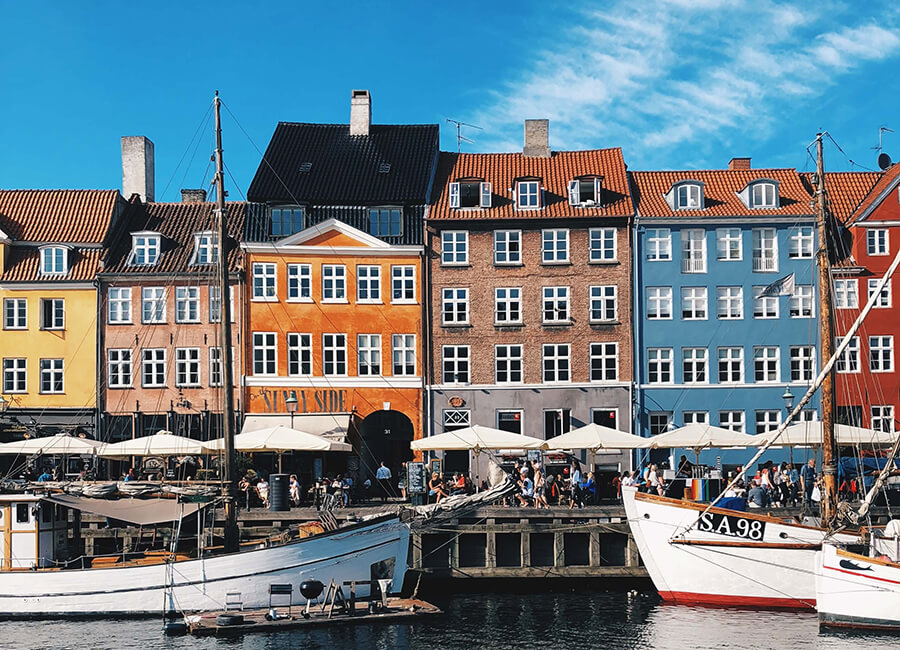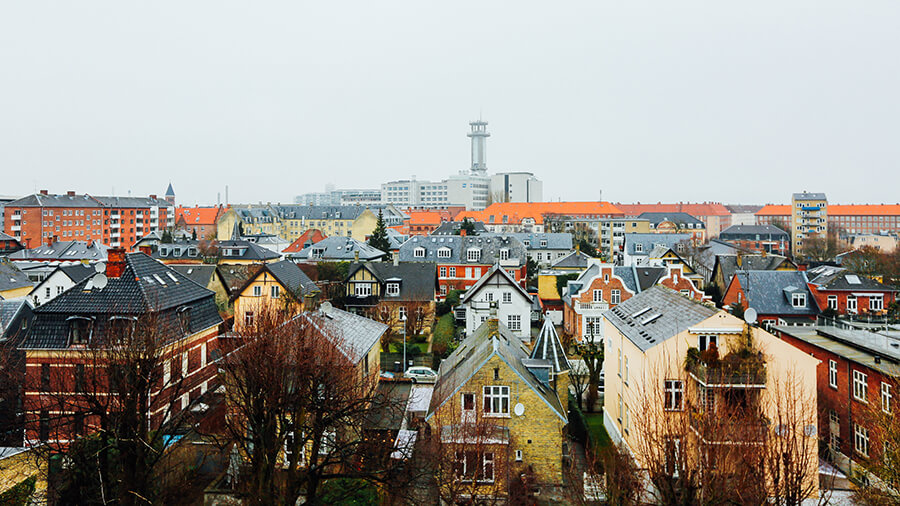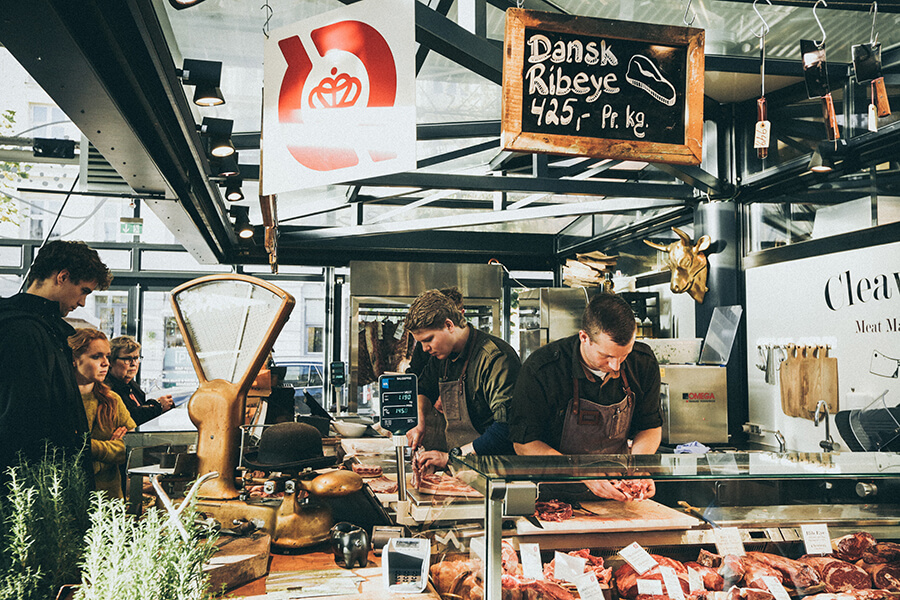Copenhagen is the capital and most populous city of Denmark, with almost 800,000 people living in the city and the metropolitan area’s population exceeding 2 million. It’s also a large ICT hub, with thousands of tech companies active in software development, R&D, sound technology, and other tech sectors.

IT salaries in Copenhagen
The average IT salary in Copenhagen is around DKK 47,600 per month (DKK 540,000 per year).
Here are average IT salaries in Copenhagen depending on specialization (DKK per month):
- Android developer: 41,900
- Business analyst: 45,660
- C# developer: 45,000
- C++ developer: 46,700
- Data analyst: 42,420
- Database administrator: 50,610
- Database developer: 44,000
- Data engineer: 45,210
- Front-end developer: 33,140
- Full-stack developer: 45,410
- Game developer: 38,700
- Information security engineer: 41,800
- iOS developer: 48,000
- IT manager: 58,130
- Java developer: 44,400
- JavaScript developer: 43,100
- Mobile developer: 43,300
- Network engineer: 38,320
- Perl developer : 37,000
- PHP developer: 36,100
- Python developer: 46,700
- Salesforce administrator: 41,500
- Salesforce developer: 31,900
- Scrum master: 49,770
- SharePoint developer: 44,400
- Software developer: 40,090
- Software engineer: 45,025
- Software tester: 37,815
- Solutions architect: 56,610
- System administrator: 41,850
- Technical writer: 39,960
- Web designer: 38,900
- Web developer: 36,080
Economy
Copenhagen is Denmark’s economic and cultural center as well as one of the major financial centers of Northern Europe. There is the Copenhagen Stock Exchange, and several large financial institutions and banks have headquarters in Copenhagen, including Alm. Brand, Danske Bank, Nordea Bank Danmark, and Nykredit.
The unemployment rate in Copenhagen was 5.1% before the COVID-19 pandemic — about the same as the national average of 5.5%.
Important economic sectors in Copenhagen and its surroundings include:
- CleanTech
- Commerce
- Finance
- Information and communications technology (ICT)
- Media
- Pharmaceuticals
- Research and development (R&D)
- Shipping
- Tourism
- Transport
Copenhagen is also a global leader in the audio and sound technology industries, with many internationally acclaimed brands present in the capital city, such as Bang & Olufsen, Brüel & Kjær, and Oticon. In addition, Hitachi has chosen Copenhagen for its first Big Data laboratory in mainland Europe.

Other important tech industries include FinTech, intelligent lighting & photonics, IT security, the Internet of Things (IoT), mobile banking technologies, and process optimization.
Some of the largest technology companies present in Copenhagen include the following:
- Bang & Olufsen
- Brüel & Kjær
- Cognizant
- Facebook
- Google
- IBM
- momondo
- Nokia
- SAP
- Unity Technologies
- Zendesk
Cost of living
Copenhagen is the 11th most expensive city in Europe, with only Swiss and Norwegian cities being ahead in terms of consumer prices, according to Numbeo Cost of Living Index.
Average monthly costs in Copenhagen are about DKK 7,600 for a single person or DKK 27,050 for a four-person family (excluding rent).
Here are examples of the average prices in Copenhagen (DKK):
- Meal at McDonald’s: 70–85
- Meal at another inexpensive restaurant: 80–200
- Average food basket (milk, bread, eggs, cheese, chicken, apples, potatoes, water, beer): 263
- Monthly fee at a fitness club: 150–400
- Monthly pass: 400–800
- Monthly rent: 5,000 – 25,000
- Property prices per square meter: 26,000 – 59,000
- Utilities: 935 – 3,000 per month
- Internet: 200–300 per month

Here are examples of the average rental prices in Copenhagen (DKK):
- Room for a single person in a shared flat: 4,000 – 6,000
- Small studio or apartment (1–2 rooms + kitchen and bathroom): 8,000 – 10,000
- Medium-sized apartment (2–3 rooms + kitchen and bathroom): 13,000 – 15,000
- Larger apartments (4–6 rooms + kitchen and bathroom): from 16,000
Travel
Copenhagen Airport, Kastrup, is the busiest airport in the Nordic countries. It serves flights to many European destinations as well as to Baghdad, Bangkok, Beijing, Delhi, Dubai, Islamabad, Lahore, San Francisco, Shanghai, Singapore, Toronto, and many others.
It’s easy to travel within the city without a car as Copenhagen has a developed public transport system and is one of the most bicycle-friendly cities in the world, with bicycles outnumbering the city inhabitants.
In addition, Copenhagen is connected to Malmö, Sweden, by the Øresund Bridge by rail and road. Both cities are located 42 km from each other.
Entertainment
You will never be bored in Copenhagen as it has everything you could wish for. The Danish capital’s landmarks and places of interest include Tivoli Gardens, Indre By (the historic center), Christianshavn, The Little Mermaid statue, the Amalienborg and Christiansborg palaces, Rosenborg Castle Gardens, Frederik’s Church, the Copenhagen Opera House, the two oldest amusement parks in the world, and around 100 museums. In addition, Copenhagen is one of the cities with the highest number of restaurants and bars per capita in the world.
If you love nature, you’ll enjoy the city’s green spaces, waterfronts, and promenades. Copenhagen is a city of parks, gardens, and open spaces, as there is an official municipal policy stating all residents must be able to reach a park or beach on foot in less than 15 minutes. One of the parks, Amager Strandpark, has almost 5 km of beaches. Another beach is located in Klampenborg, about 10 km from downtown Copenhagen.